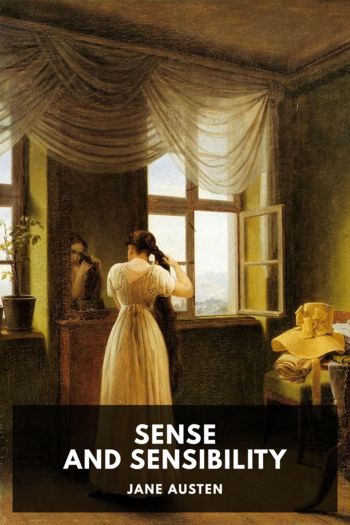Sense and Sensibility - Jane Austen (classic literature list txt) 📗

- Author: Jane Austen
Book online «Sense and Sensibility - Jane Austen (classic literature list txt) 📗». Author Jane Austen
“I understand you,” said Elinor. “You have something to tell me of Mr. Willoughby, that will open his character farther. Your telling it will be the greatest act of friendship that can be shown Marianne. My gratitude will be insured immediately by any information tending to that end, and hers must be gained by it in time. Pray, pray let me hear it.”
“You shall; and, to be brief, when I quitted Barton last October—but this will give you no idea—I must go farther back. You will find me a very awkward narrator, Miss Dashwood; I hardly know where to begin. A short account of myself, I believe, will be necessary, and it shall be a short one. On such a subject,” sighing heavily, “can I have little temptation to be diffuse.”
He stopped a moment for recollection, and then, with another sigh, went on.
“You have probably entirely forgotten a conversation—(it is not to be supposed that it could make any impression on you)—a conversation between us one evening at Barton Park—it was the evening of a dance—in which I alluded to a lady I had once known, as resembling, in some measure, your sister Marianne.”
“Indeed,” answered Elinor, “I have not forgotten it.” He looked pleased by this remembrance, and added—
“If I am not deceived by the uncertainty, the partiality of tender recollection, there is a very strong resemblance between them, as well in mind as person. The same warmth of heart, the same eagerness of fancy and spirits. This lady was one of my nearest relations, an orphan from her infancy, and under the guardianship of my father. Our ages were nearly the same, and from our earliest years we were playfellows and friends. I cannot remember the time when I did not love Eliza; and my affection for her, as we grew up, was such, as perhaps, judging from my present forlorn and cheerless gravity, you might think me incapable of having ever felt. Hers, for me, was, I believe, fervent as the attachment of your sister to Mr. Willoughby and it was, though from a different cause, no less unfortunate. At seventeen she was lost to me forever. She was married—married against her inclination to my brother. Her fortune was large, and our family estate much encumbered. And this, I fear, is all that can be said for the conduct of one, who was at once her uncle and guardian. My brother did not deserve her; he did not even love her. I had hoped that her regard for me would support her under any difficulty, and for some time it did; but at last the misery of her situation, for she experienced great unkindness, overcame all her resolution, and though she had promised me that nothing—but how blindly I relate! I have never told you how this was brought on. We were within a few hours of eloping together for Scotland. The treachery, or the folly, of my cousin’s maid betrayed us. I was banished to the house of a relation far distant, and she was allowed no liberty, no society, no amusement, till my father’s point was gained. I had depended on her fortitude too far, and the blow was a severe one—but had her marriage been happy, so young as I then was, a few months must have reconciled me to it, or at least I should not have now to lament it. This however was not the case. My brother had no regard for her; his pleasures were not what they ought to have been, and from the first he treated her unkindly. The consequence of this, upon a mind so young, so lively, so inexperienced as Mrs. Brandon’s, was but too natural. She resigned herself at first to all the misery of her situation; and happy had it been if she had not lived to overcome those regrets which the remembrance of me occasioned. But can we wonder that, with such a husband to provoke inconstancy, and without a friend to advise or restrain her (for my father lived only a few months after their marriage, and I was with my regiment in the East Indies) she should fall? Had I remained in England, perhaps—but I meant to promote the happiness of both by removing from her for years, and for that purpose had procured my exchange. The shock which her marriage had given me,” he continued, in a voice of great agitation, “was of trifling weight—was nothing to what I felt when I heard, about two years afterwards, of her divorce. It was that which threw this gloom—even now the recollection of what I suffered—”
He could say no more, and rising hastily walked for a few minutes about the room. Elinor, affected by his relation, and still more by his distress, could not speak. He saw her concern, and coming to her, took her hand, pressed it, and kissed it with grateful respect. A few minutes more of silent exertion enabled him to proceed with composure.
“It was nearly three years after this unhappy period before I returned to England. My first care, when I did arrive, was of course to seek for her; but the search was as fruitless as it was melancholy. I could not trace her beyond her first seducer, and there was every reason to fear that she had removed from him only to sink deeper in a life of sin. Her legal allowance was not adequate to her fortune, nor sufficient for her comfortable maintenance, and I learnt from my brother that the power of receiving it had been made over some months before to another person. He imagined, and calmly could he imagine it, that her extravagance, and consequent distress, had obliged her to





Comments (0)